Ezra 3 meaning explained in AI Summary
Ezra chapter 3 details the return of the exiled Israelites to Jerusalem and the beginning of the reconstruction of the Temple under the leadership of Zerubbabel and Jeshua.
1. Rebuilding the Altar (vv. 1-6):
- The Israelites gather in Jerusalem in the seventh month (Tishri) after their return from exile.
- They prioritize rebuilding the altar for burnt offerings, following the Law of Moses.
- They offer sacrifices on the altar, celebrating the Feast of Booths despite not having a temple yet.
2. Laying the Temple Foundation (vv. 7-13):
- In the second month (Ziv), the foundation of the Temple is laid.
- Priests in their robes and Levites with trumpets participate in the ceremony, praising the Lord.
- The people rejoice with shouts of joy, while the elders who remember the former Temple weep.
- The mixed emotions highlight the bittersweet nature of rebuilding after destruction.
3. Opposition and Discouragement (vv. 10-13):
- The enemies of Judah and Benjamin, those who had settled in the land during the exile, offer to help rebuild.
- Zerubbabel and the leaders refuse their offer, fearing compromise and wanting to maintain the purity of the Temple's reconstruction.
- The enemies become adversaries, actively working to discourage and hinder the rebuilding efforts.
Key Themes:
- Obedience and Worship: The Israelites prioritize rebuilding the altar and offering sacrifices, demonstrating their commitment to God and His Law.
- Joy and Sorrow: The rebuilding process evokes both joy at the restoration and sorrow at the memory of what was lost.
- Opposition and Perseverance: Despite facing opposition, the Israelites remain determined to rebuild the Temple, showcasing their resilience and faith.
Significance:
Ezra 3 marks a pivotal moment in the restoration of Israel. It highlights the importance of worship, the perseverance of faith in the face of adversity, and the challenges of rebuilding after destruction. This chapter sets the stage for the ongoing struggle to rebuild the Temple and restore Jerusalem, a struggle that continues throughout the book of Ezra.
Ezra 3 bible study ai commentary
The central theme of Ezra 3 is the re-establishment of covenant worship as the foundational act of the restored community. Upon returning to Jerusalem, the people’s first priority is not political or structural, but spiritual: rebuilding the altar for sacrifice and reinstituting the ordained feasts. This act, rooted in obedience to God’s law and motivated by both fear and faith, culminates in the laying of the temple’s foundation, a moment of profound, mixed emotions—joy for the new beginning and sorrow for the glory that was lost.
Ezra 3 Context
The events of Ezra 3 take place around 537 BC, immediately following the return of the first wave of nearly 50,000 Jewish exiles from Babylon. This return was authorized by the decree of Cyrus the Great, the Persian emperor who conquered Babylon, an event prophesied by Isaiah (Isa 44:28–45:4). The exiles arrive in a desolate Jerusalem, a city largely in ruins since its destruction by the Babylonians in 586 BC. They are led by two key figures: Zerubbabel, the governor and a descendant of King David, and Jeshua (or Joshua), the high priest from the line of Aaron. The community is small, vulnerable, and surrounded by peoples who are suspicious and will soon become hostile. Their primary task is to restore their identity as the people of Yahweh, which begins with the central act of public worship.
Ezra 3:1
When the seventh month came, and the children of Israel were in the towns, the people gathered as one man to Jerusalem.
In-depth-analysis
- The Seventh Month (Tishri): This is a theologically significant month in the Jewish calendar, containing the Day of Atonement (Yom Kippur) and the Feast of Tabernacles/Booths (Sukkot). Their gathering was intentionally timed for this sacred period.
- Gathered as One Man: The Hebrew expression
ke'ish echademphasizes a profound and complete unity of purpose. After the fracture and scattering of the exile, the remnant is now unified in its core mission: to worship God. This unity is essential for the restoration.
Bible references
- Leviticus 23:24-43: "On the fifteenth day of this seventh month is the Feast of Booths... you shall present a food offering..." (Describes the sacred feasts of the seventh month, which the people are about to observe).
- Nehemiah 8:1: "And all the people gathered as one man into the square before the Water Gate." (Shows this phrase used again for the unified gathering to hear the Law read under Ezra).
- Judges 20:1: "Then all the people of Israel came out... and the congregation was assembled as one man..." (Highlights the same term for total national unity, in that case for war).
Cross references
Deu 16:16 (Mandatory pilgrimage feasts); 1Chr 12:38 (Unity of heart); Php 2:2 (Being of one mind).
Ezra 3:2
Then arose Jeshua the son of Jozadak, with his fellow priests, and Zerubbabel the son of Shealtiel, with his kinsmen, and they built the altar of the God of Israel, to offer burnt offerings on it, as it is written in the Law of Moses the man of God.
In-depth-analysis
- Dual Leadership: The work begins under the joint leadership of Jeshua (high priest, representing religious authority) and Zerubbabel (governor, representing civil/Davidic authority). This partnership is a key theme in the restoration and is highlighted by the prophets Haggai and Zechariah.
- Altar First: Before the temple walls or even its foundation, they build the altar (
mizbeah). This prioritizes atonement, communion, and right relationship with God over the physical structure. Worship precedes the building of the house. - "As It Is Written": This phrase asserts the legitimacy of their actions. They are not inventing new worship but deliberately and carefully returning to the commands of the Torah, establishing continuity with Israel's pre-exilic faith.
Bible references
- Haggai 1:1, 14: "...the word of the Lord came by Haggai the prophet to Zerubbabel... and to Joshua..." (Identifies them as contemporaries and the key leaders of the rebuilding effort).
- Exodus 27:1-8: "You shall make the altar of acacia wood..." (Provides the Mosaic instructions for the original tabernacle altar).
- Zechariah 6:12-13: "Behold, the man whose name is the Branch... It is he who shall build the temple... and shall bear royal honor, and shall sit and rule on his throne. And there shall be a priest on his throne, and the counsel of peace shall be between them both." (A messianic prophecy highlighting this model of priestly and royal leadership in harmony).
Cross references
1Kgs 18:30 (Elijah repairing the altar); Deu 12:5-6 (The chosen place for sacrifice); Heb 13:10 (The altar of the New Covenant).
Ezra 3:3
They set the altar on its foundations, for fear was on them because of the peoples of the lands. And they offered burnt offerings on it to the Lord, burnt offerings morning and evening.
In-depth-analysis
- On Its Foundations: They don't just build an altar; they build it on the original, sanctified site of Solomon’s temple altar. This reinforces the theme of continuity and restoration, not replacement.
- "For Fear Was on Them": Their primary motivation was fear of their hostile neighbors. Instead of building walls for physical defense, their first act of defense was spiritual: securing God's presence and favor through sacrifice. Their worship was an act of faith and a declaration of dependence on Yahweh in a hostile environment.
- Morning and Evening: They immediately reinstitute the
Tamid, the continual burnt offering (Num 28:3-8), the foundational, daily sacrifice that symbolized Israel's unbroken communion with God.
Bible references
- Numbers 28:3-4: "...a regular burnt offering throughout your generations... one lamb you shall offer in the morning, and the other lamb you shall offer at twilight." (The law for the daily offerings).
- Ezra 4:4: "Then the people of the land discouraged the people of Judah and made them afraid to build." (Clarifies that their fear was justified, as opposition was real).
- 2 Chronicles 32:7-8: "Be strong and courageous. Do not be afraid or dismayed... With him is an arm of flesh, but with us is the Lord our God, to help us and to fight our battles." (Provides the theological response to fear: trust in God).
Cross references
Psa 27:1 (The Lord is my light and salvation); Psa 56:3-4 (When I am afraid I put my trust in You); 2Kgs 16:10-15 (Ahaz defiling the altar).
Polemics
The act of public, exclusive worship of Yahweh on this specific site was a polemic against the syncretistic and polytheistic practices of the surrounding peoples (am ha'aretz). While other cultures built defenses and made political alliances when afraid, Israel’s first move was to re-center their national life on the altar of Yahweh. This declared that their security and identity came from Him alone.
Ezra 3:4-6
And they kept the Feast of Booths, as it is written, and offered the daily burnt offerings by number according to the rule, as each day required, and after that the regular burnt offering, the offerings at the new moons and at all the appointed feasts of the Lord, and the offerings of everyone who made a freewill offering to the Lord. From the first day of the seventh month they began to offer burnt offerings to the Lord. But the foundation of the temple of the Lord was not yet laid.
In-depth-analysis
- Feast of Booths (Sukkot): This specific feast was particularly poignant. It commemorated God's provision for Israel during the 40 years of wandering in the wilderness after the Exodus (Lev 23:43). For the returned exiles, it was a "new wilderness" experience, and celebrating this feast reaffirmed their trust in God's provision for them in their vulnerable state.
- Meticulous Obedience: The text emphasizes their careful adherence to the whole sacrificial calendar—daily, new moon, appointed feasts, and freewill offerings. They restored the full rhythm of a life governed by God’s commands.
- Worship Without a Temple: Verse 6 explicitly states the priority: the relationship with God, mediated through sacrifice at the altar, was established before the temple foundation was even laid. The house was for God, but the altar was for the people's relationship with God.
Bible references
- Nehemiah 8:17: "And all the assembly of those who had returned from the captivity made booths and lived in the booths, for from the days of Joshua the son of Nun to that day the people of Israel had not done so." (Highlights the significance and renewed enthusiasm for this particular feast during the restoration period).
- Numbers 29:12-38: (Details the specific, numerous sacrifices required "by number according to the rule" for each day of the Feast of Booths, which they followed).
- John 7:2, 37: "Now the Jews' Feast of Booths was at hand... On the last day of the feast... Jesus stood up and cried out, 'If anyone thirsts, let him come to me and drink.'" (Jesus uses the water-drawing ceremony of this feast to declare Himself the fulfillment of its meaning).
Cross references
Lev 23:33-43 (Law of the feast); Deu 31:10-13 (Reading law at the feast); Zec 14:16-19 (Prophecy of nations keeping the feast); Heb 9:9-14 (The insufficiency of OT sacrifices).
Ezra 3:7
They gave money to the masons and the carpenters, and food, drink, and oil to the Sidonians and the Tyrians to bring cedar trees from Lebanon to the sea, to Joppa, according to the grant that they had from Cyrus king of Persia.
In-depth-analysis
- Echoes of Solomon: This verse deliberately parallels the construction of the first temple. Solomon also contracted with the Tyrians (Hiram) for the cedars of Lebanon (1 Kgs 5:6-11). By emulating Solomon's process, they are positioning their work as a legitimate restoration of that first house.
- Persian Authorization: The project proceeds with the official sanction and support ("grant") of the Persian Empire. This shows God working through a pagan ruler (Isa 45:1) to accomplish His purposes. Their ability to trade and build depended on this political reality.
Bible references
- 1 Kings 5:6-9: "Command that cedars of Lebanon be cut for me... Hiram... sent to Solomon, saying... I will do all you desire concerning timber of cedar..." (The direct precedent for acquiring materials for the temple).
- 2 Chronicles 2:16: "We will cut whatever timber you need from Lebanon and bring it to you in rafts by sea to Joppa, so that you may take it up to Jerusalem." (The specific route for Solomon's timber, identical to the one used here).
- Ezra 1:1-4: "...the Lord stirred up the spirit of Cyrus king of Persia... 'The Lord... has charged me to build him a house at Jerusalem.'" (The original decree from Cyrus that authorized the entire project).
Cross references
Ezr 6:3-5 (The decree specifying dimensions and funding).
Ezra 3:8-9
Now in the second year of their coming to the house of God at Jerusalem, in the second month, Zerubbabel the son of Shealtiel and Jeshua the son of Jozadak made a beginning, together with the rest of their kinsmen, the priests and the Levites and all who had come from the captivity to Jerusalem. They appointed the Levites, from twenty years old and upward, to supervise the work of the house of the Lord. And Jeshua with his sons and his brothers, and Kadmiel and his sons, the sons of Judah, together supervised the workmen in the house of God, along with the sons of Henadad and the Levites, their sons and brothers.
In-depth-analysis
- Precise Timing: The foundation is laid in the second month of their second year. The second month (Iyar/Ziv) is when Solomon began his temple (1 Kgs 6:1), again creating a deliberate parallel.
- Levitical Supervision: In accordance with the Law, the Levites are placed in charge of overseeing the work. This is not merely a construction project; it is a sacred duty. The age requirement ("twenty years old and upward") mirrors the standard set by King David (1 Chr 23:24-27).
- Unity Again: The repetition of "together" (
yachad) and the listing of different Levitical families emphasizes the broad-based cooperation and shared purpose in the sacred work.
Bible references
- 1 Kings 6:1: "In the four hundred and eightieth year after the people of Israel came out of... Egypt, in the fourth year of Solomon's reign... in the month of Ziv, which is the second month, he began to build the house of the Lord." (The exact timing precedent).
- 1 Chronicles 23:24, 27: "...the Levites, from twenty years old and upward... to have charge of the work of the service of the house of the Lord." (The Davidic precedent for the age of Levitical service).
- Numbers 4:3: "...from thirty years old up to fifty years old... to do the work in the tent of meeting." (The older Mosaic requirement for Levitical service, which David later amended for non-transport duties).
Ezra 3:10-11
And when the builders laid the foundation of the temple of the Lord, the priests in their vestments came forward with trumpets, and the Levites, the sons of Asaph, with cymbals, to praise the Lord, according to the directions of David king of Israel. And they sang responsively, praising and giving thanks to the Lord, “For he is good, for his steadfast love endures forever toward Israel.” And all the people gave a great shout of praise to the Lord, because the foundation of the house of the Lord was laid.
In-depth-analysis
- Davidic Liturgy: The ceremony is explicitly conducted "according to the directions of David" (cf. 1 Chr 25). This was a restoration not just of a building but of the proper, God-ordained forms of praise and worship established by Israel's great king. Priests had trumpets, and Levites (sons of Asaph) had cymbals.
- "His Steadfast Love Endures Forever": The refrain they sing (
Ki Tov, Ki L'olam Chasdo) is one of the most significant liturgical expressions in the Old Testament. It declares God'shesed—his covenant loyalty, mercy, and loving-kindness. This was the same song sung at the dedication of Solomon's temple (2 Chr 7:3, 6). - Responsive Singing: This was a joyful, communal act where groups sang back and forth, culminating in a "great shout" from all the people, signifying corporate celebration and praise.
Bible references
- 2 Chronicles 7:3: "When all the people of Israel saw... the glory of the Lord... they... worshiped and gave thanks to the Lord, saying, 'For he is good, for his steadfast love endures forever.'" (The dedication of Solomon's Temple, with the same response).
- Psalm 136:1: "Give thanks to the Lord, for he is good, for his steadfast love endures forever." (This entire psalm is structured around this refrain).
- Jeremiah 33:11: "...the voice of those who sing, as they bring thank offerings... ‘Give thanks to the Lord of hosts, for the Lord is good, for his steadfast love endures forever!’ For I will restore the fortunes of the land as at first, says the Lord." (A direct prophecy of this exact scene of restoration).
Cross references
1Chr 15:16 (David's organization of music); 1Chr 16:34, 41 (Use of the refrain); Ps 106:1, 107:1, 118:1 (Use of the refrain); Rev 19:1 (The great shouts of praise in heaven).
Ezra 3:12-13
But many of the priests and Levites and heads of fathers' houses, old men who had seen the first house, wept with a loud voice when they saw the foundation of this house being laid, though many shouted aloud for joy, so that the people could not distinguish the sound of the joyful shout from the sound of the people's weeping, for the people shouted with a great shout, and the sound was heard far away.
In-depth-analysis
- The Weeping of the Elders: The old men weep because they remember the magnificent scale and glory of Solomon's temple. In comparison, this new foundation was likely much smaller and humbler. Their tears were of grief for what was lost through sin and judgment, and a poignant reminder that this restoration, while good, was not a full return to former glory.
- Mixed Emotions: The sound was a fusion of joy and sorrow. This perfectly captures the "already/not yet" tension of the restoration era. It was a new beginning ("already" a foundation), but far from the ultimate hope ("not yet" the glory of the past or the promised future).
- An Undistinguished Sound: The noise was a cacophony of human emotion—shouts of hope for the future mingling with sobs of grief for the past. It's a realistic, complex, and theologically rich portrait of God's people in a time of partial restoration.
Bible references
- Haggai 2:3: “‘Who is left among you who saw this house in its former glory? How do you see it now? Is it not as nothing in your eyes?’” (The prophet Haggai directly addresses this feeling of disappointment among the elders).
- Zechariah 4:10: "For whoever has despised the day of small things shall rejoice..." (God encourages the leaders not to be discouraged by the humble beginnings of the new temple).
- Psalm 126:5-6: "Those who sow in tears shall reap with shouts of joy! He who goes out weeping... shall come home with shouts of joy..." (Reflects the emotional journey from the sorrow of exile to the joy of restoration).
Cross references
Lk 2:25-35 (Simeon's joy and prophecy of sorrow); Rom 8:22-23 (The groaning of creation and believers for full redemption).
Polemics
This passage serves as an internal polemic against unrealistic triumphalism. It soberly reminds the reader that God's work of restoration is often progressive and begins in "small things." It counters any idea that the return from exile immediately erased the consequences of generations of sin. The true, full restoration of glory awaited a future work of God, a theme the New Testament picks up in pointing to Christ and the Church as the true Temple.
Ezra chapter 3 analysis
- Leadership Model: The consistent joint leadership of Zerubbabel (civil) and Jeshua (priestly) serves as a template for the restored community's governance, reflecting a "separation of powers" under God's authority. This harmony is presented as ideal and is a subject of Zechariah's prophecies concerning the "two anointed ones" (Zec 4:14).
- Theological Priorities: The chapter structures a paradigm for any work of spiritual restoration: 1. Unity of God's people ("as one man"). 2. Re-establishing atonement and a right relationship with God (the altar). 3. Meticulous obedience to God's revealed Word (the feasts "as it is written"). 4. Only then, the building of the structure (the foundation). The relationship is always prior to the institution.
- A "Day of Small Things": While a moment of immense victory, the final verses temper the celebration. The weeping of the elders grounds the narrative in reality. The second temple, even when finished, would never match Solomon's. This theological tension points forward, creating a longing for a greater glory yet to come, fulfilled not in a building, but in the person of Jesus Christ (Jn 2:19-21) and his body, the church (1Co 3:16, Eph 2:20-22).
Ezra 3 Summary
United in Jerusalem during the sacred seventh month, the returned exiles, led by Jeshua and Zerubbabel, prioritize their relationship with God by rebuilding the altar on its original site and restoring the sacrificial system as prescribed by the Law. Later, they lay the temple's foundation with a great ceremony of praise echoing King David's time. This momentous occasion is marked by a complex, powerful mix of joyful shouts from the younger generation and loud weeping from the elders who remembered the greater glory of Solomon's temple.
Ezra 3 AI Image Audio and Video
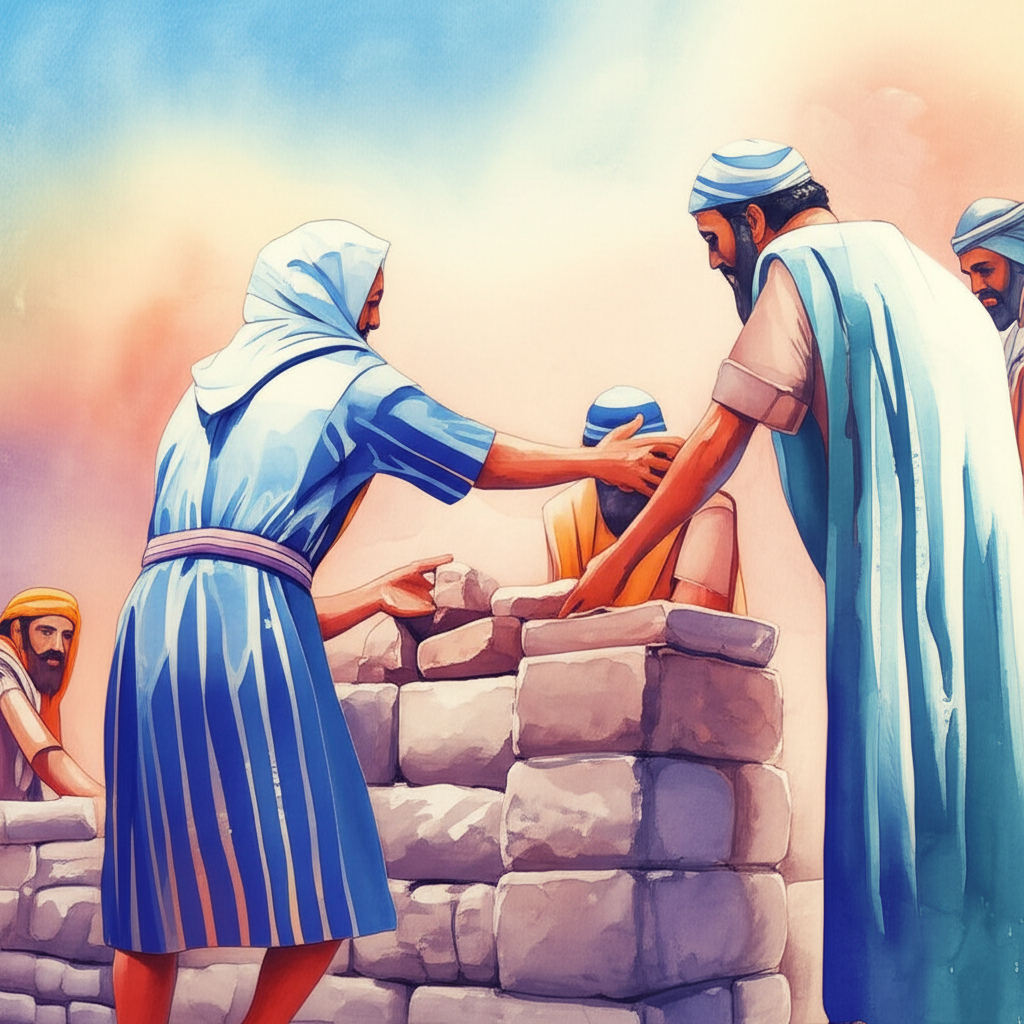
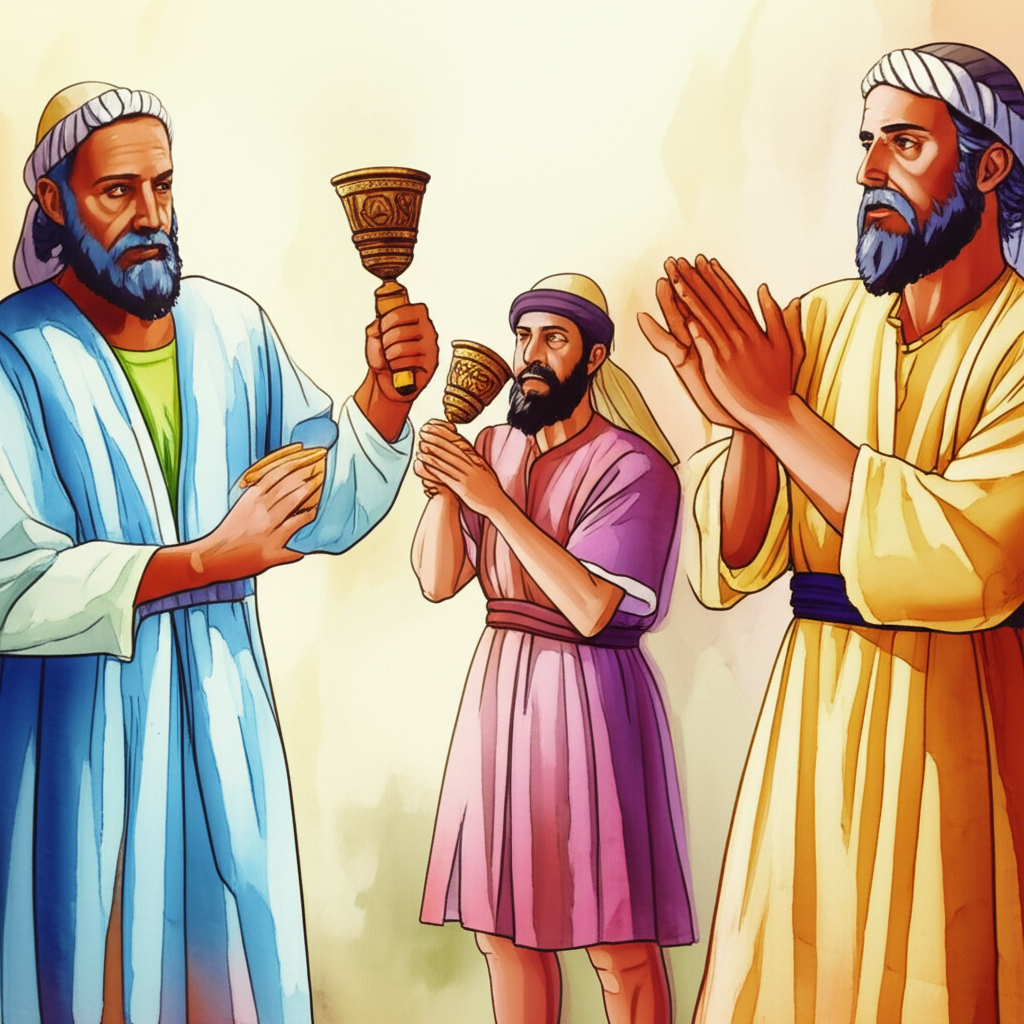
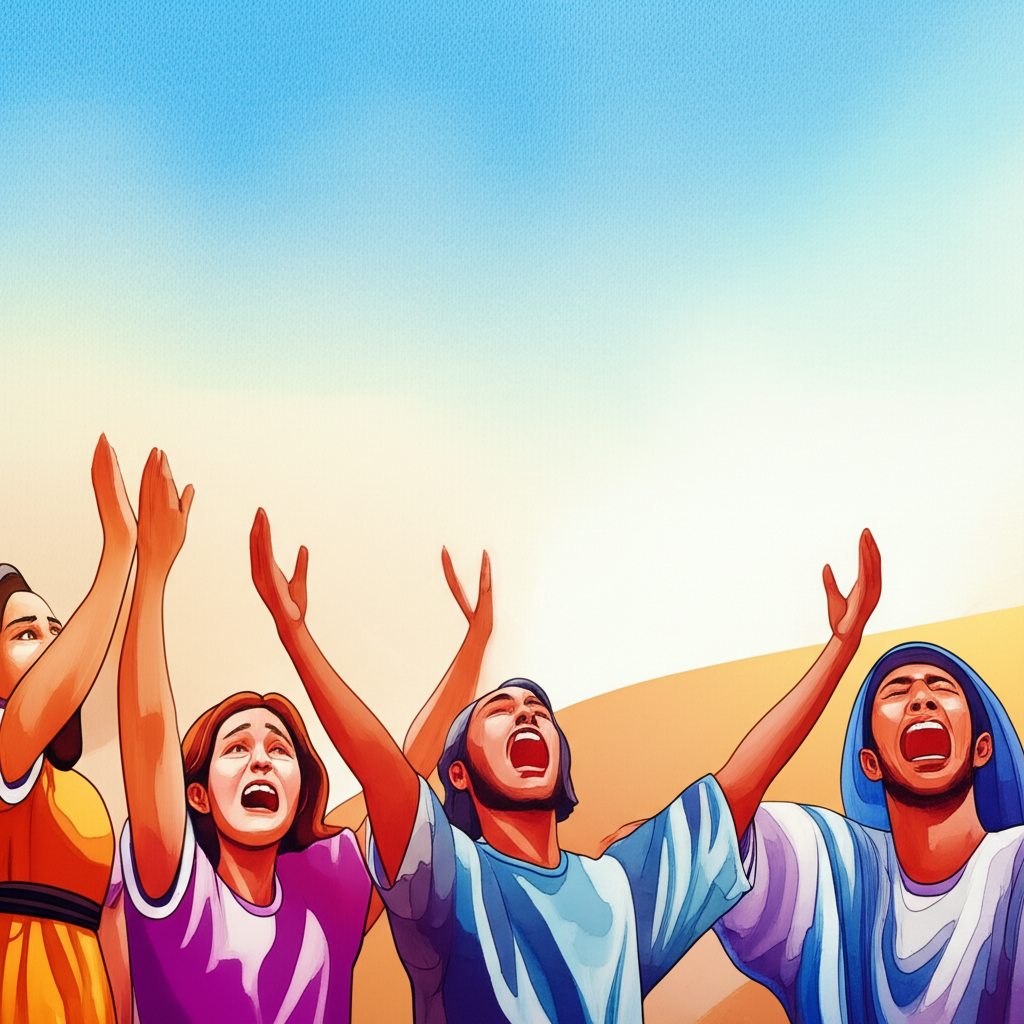
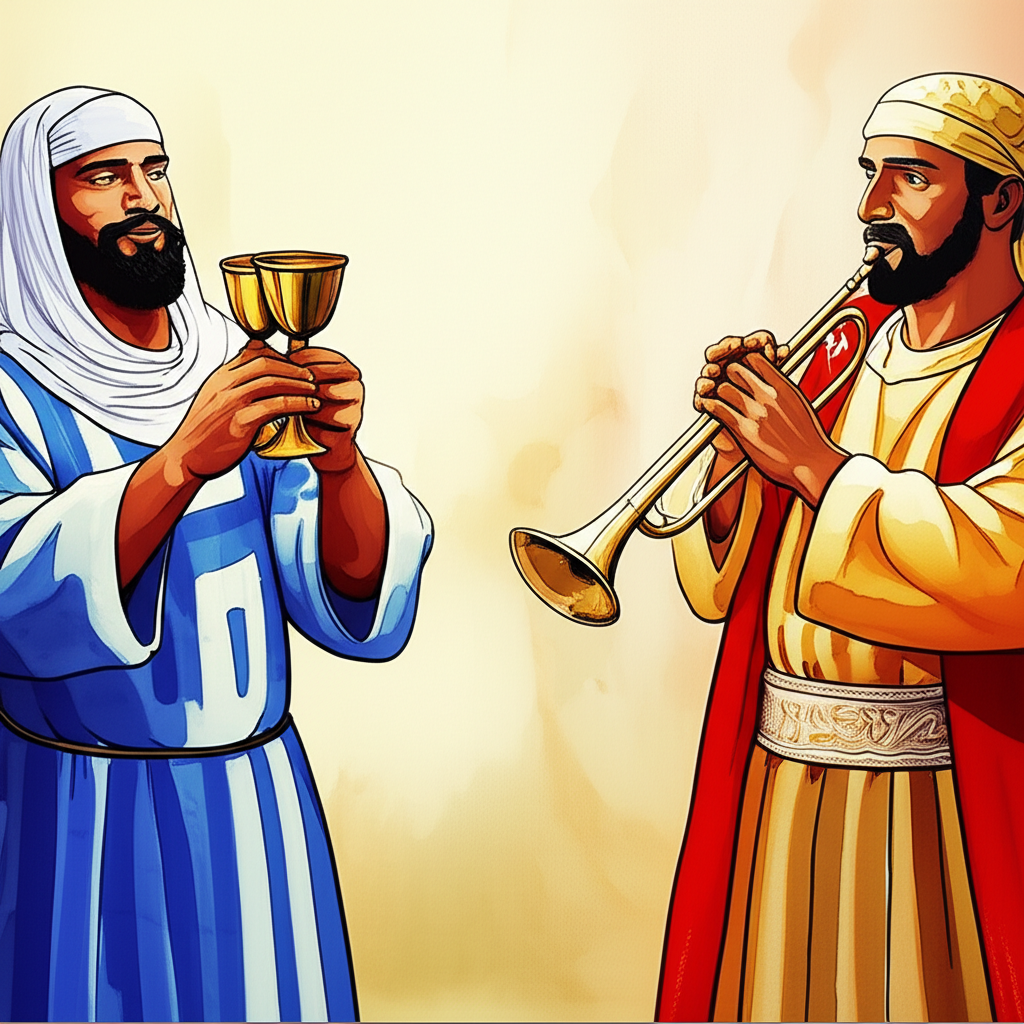
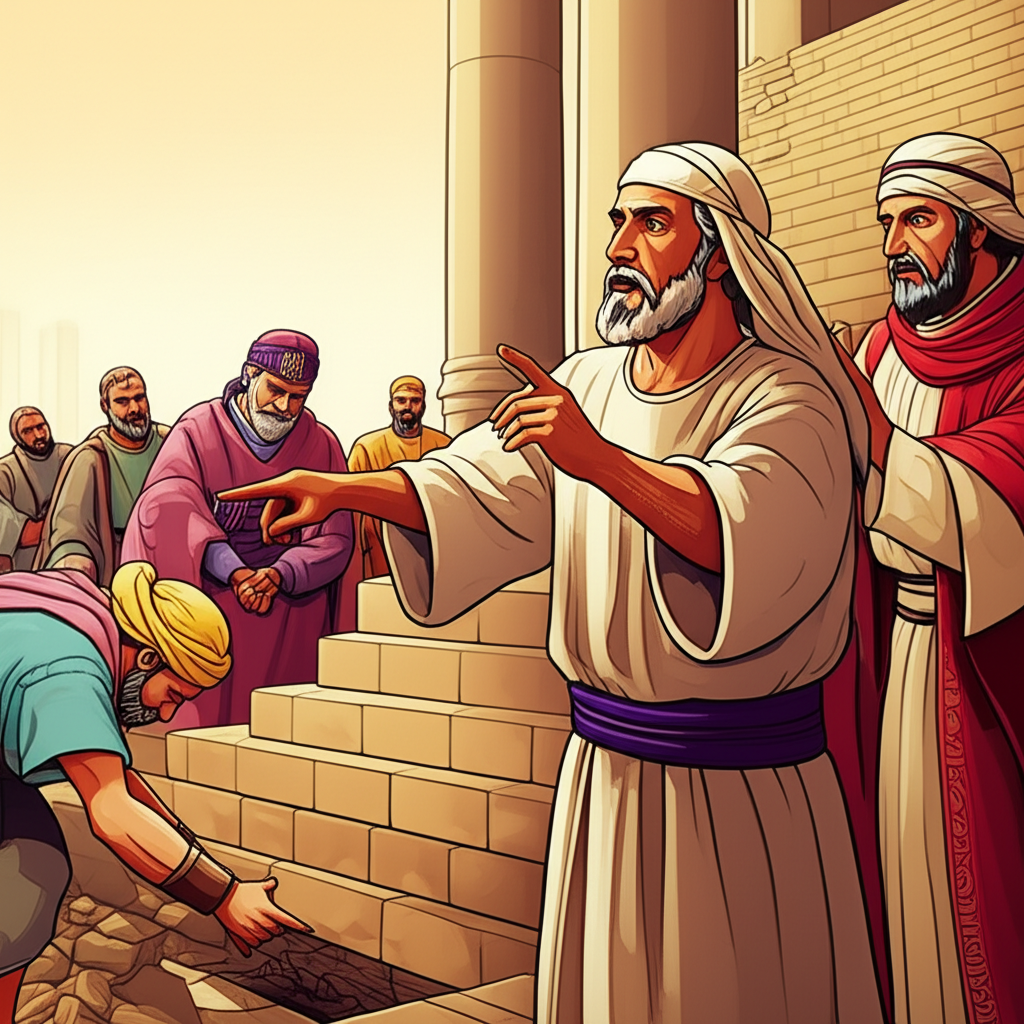

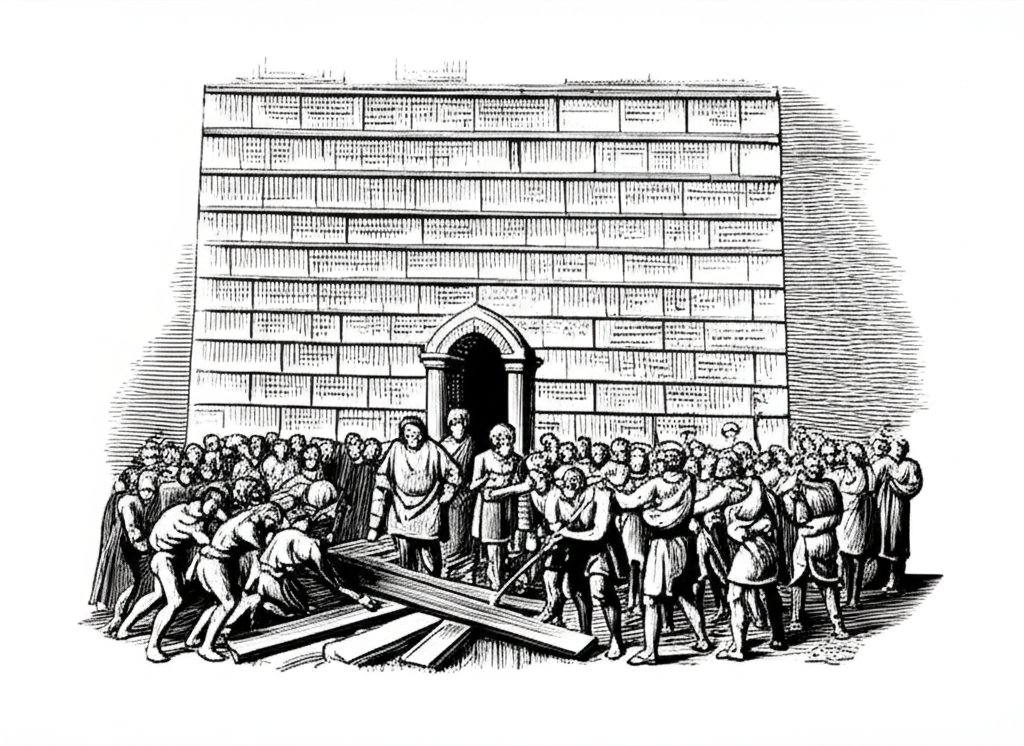
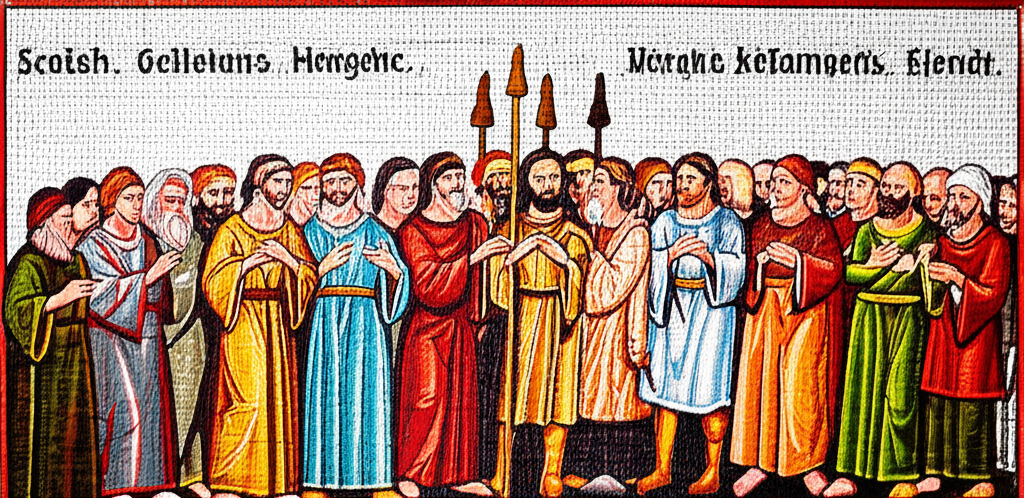
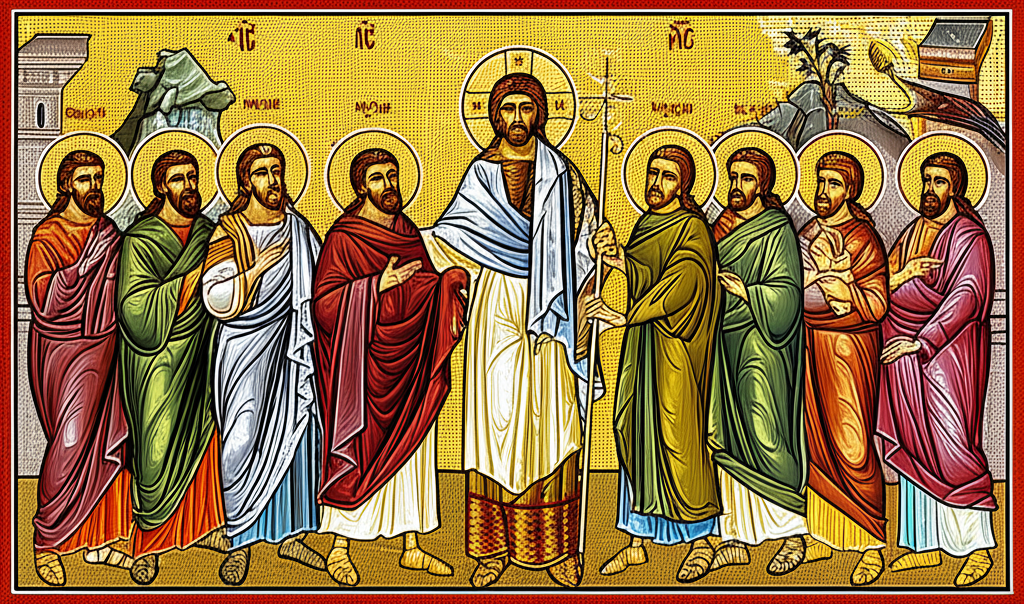
Ezra chapter 3 kjv
- 1 And when the seventh month was come, and the children of Israel were in the cities, the people gathered themselves together as one man to Jerusalem.
- 2 Then stood up Jeshua the son of Jozadak, and his brethren the priests, and Zerubbabel the son of Shealtiel, and his brethren, and builded the altar of the God of Israel, to offer burnt offerings thereon, as it is written in the law of Moses the man of God.
- 3 And they set the altar upon his bases; for fear was upon them because of the people of those countries: and they offered burnt offerings thereon unto the LORD, even burnt offerings morning and evening.
- 4 They kept also the feast of tabernacles, as it is written, and offered the daily burnt offerings by number, according to the custom, as the duty of every day required;
- 5 And afterward offered the continual burnt offering, both of the new moons, and of all the set feasts of the LORD that were consecrated, and of every one that willingly offered a freewill offering unto the LORD.
- 6 From the first day of the seventh month began they to offer burnt offerings unto the LORD. But the foundation of the temple of the LORD was not yet laid.
- 7 They gave money also unto the masons, and to the carpenters; and meat, and drink, and oil, unto them of Zidon, and to them of Tyre, to bring cedar trees from Lebanon to the sea of Joppa, according to the grant that they had of Cyrus king of Persia.
- 8 Now in the second year of their coming unto the house of God at Jerusalem, in the second month, began Zerubbabel the son of Shealtiel, and Jeshua the son of Jozadak, and the remnant of their brethren the priests and the Levites, and all they that were come out of the captivity unto Jerusalem; and appointed the Levites, from twenty years old and upward, to set forward the work of the house of the LORD.
- 9 Then stood Jeshua with his sons and his brethren, Kadmiel and his sons, the sons of Judah, together, to set forward the workmen in the house of God: the sons of Henadad, with their sons and their brethren the Levites.
- 10 And when the builders laid the foundation of the temple of the LORD, they set the priests in their apparel with trumpets, and the Levites the sons of Asaph with cymbals, to praise the LORD, after the ordinance of David king of Israel.
- 11 And they sang together by course in praising and giving thanks unto the LORD; because he is good, for his mercy endureth for ever toward Israel. And all the people shouted with a great shout, when they praised the LORD, because the foundation of the house of the LORD was laid.
- 12 But many of the priests and Levites and chief of the fathers, who were ancient men, that had seen the first house, when the foundation of this house was laid before their eyes, wept with a loud voice; and many shouted aloud for joy:
- 13 So that the people could not discern the noise of the shout of joy from the noise of the weeping of the people: for the people shouted with a loud shout, and the noise was heard afar off.
Ezra chapter 3 nkjv
- 1 And when the seventh month had come, and the children of Israel were in the cities, the people gathered together as one man to Jerusalem.
- 2 Then Jeshua the son of Jozadak and his brethren the priests, and Zerubbabel the son of Shealtiel and his brethren, arose and built the altar of the God of Israel, to offer burnt offerings on it, as it is written in the Law of Moses the man of God.
- 3 Though fear had come upon them because of the people of those countries, they set the altar on its bases; and they offered burnt offerings on it to the LORD, both the morning and evening burnt offerings.
- 4 They also kept the Feast of Tabernacles, as it is written, and offered the daily burnt offerings in the number required by ordinance for each day.
- 5 Afterwards they offered the regular burnt offering, and those for New Moons and for all the appointed feasts of the LORD that were consecrated, and those of everyone who willingly offered a freewill offering to the LORD.
- 6 From the first day of the seventh month they began to offer burnt offerings to the LORD, although the foundation of the temple of the LORD had not been laid.
- 7 They also gave money to the masons and the carpenters, and food, drink, and oil to the people of Sidon and Tyre to bring cedar logs from Lebanon to the sea, to Joppa, according to the permission which they had from Cyrus king of Persia.
- 8 Now in the second month of the second year of their coming to the house of God at Jerusalem, Zerubbabel the son of Shealtiel, Jeshua the son of Jozadak, and the rest of their brethren the priests and the Levites, and all those who had come out of the captivity to Jerusalem, began work and appointed the Levites from twenty years old and above to oversee the work of the house of the LORD.
- 9 Then Jeshua with his sons and brothers, Kadmiel with his sons, and the sons of Judah, arose as one to oversee those working on the house of God: the sons of Henadad with their sons and their brethren the Levites.
- 10 When the builders laid the foundation of the temple of the LORD, the priests stood in their apparel with trumpets, and the Levites, the sons of Asaph, with cymbals, to praise the LORD, according to the ordinance of David king of Israel.
- 11 And they sang responsively, praising and giving thanks to the LORD: "For He is good, For His mercy endures forever toward Israel." Then all the people shouted with a great shout, when they praised the LORD, because the foundation of the house of the LORD was laid.
- 12 But many of the priests and Levites and heads of the fathers' houses, old men who had seen the first temple, wept with a loud voice when the foundation of this temple was laid before their eyes. Yet many shouted aloud for joy,
- 13 so that the people could not discern the noise of the shout of joy from the noise of the weeping of the people, for the people shouted with a loud shout, and the sound was heard afar off.
Ezra chapter 3 niv
- 1 When the seventh month came and the Israelites had settled in their towns, the people assembled together as one in Jerusalem.
- 2 Then Joshua son of Jozadak and his fellow priests and Zerubbabel son of Shealtiel and his associates began to build the altar of the God of Israel to sacrifice burnt offerings on it, in accordance with what is written in the Law of Moses the man of God.
- 3 Despite their fear of the peoples around them, they built the altar on its foundation and sacrificed burnt offerings on it to the LORD, both the morning and evening sacrifices.
- 4 Then in accordance with what is written, they celebrated the Festival of Tabernacles with the required number of burnt offerings prescribed for each day.
- 5 After that, they presented the regular burnt offerings, the New Moon sacrifices and the sacrifices for all the appointed sacred festivals of the LORD, as well as those brought as freewill offerings to the LORD.
- 6 On the first day of the seventh month they began to offer burnt offerings to the LORD, though the foundation of the LORD's temple had not yet been laid.
- 7 Then they gave money to the masons and carpenters, and gave food and drink and olive oil to the people of Sidon and Tyre, so that they would bring cedar logs by sea from Lebanon to Joppa, as authorized by Cyrus king of Persia.
- 8 In the second month of the second year after their arrival at the house of God in Jerusalem, Zerubbabel son of Shealtiel, Joshua son of Jozadak and the rest of the people (the priests and the Levites and all who had returned from the captivity to Jerusalem) began the work. They appointed Levites twenty years old and older to supervise the building of the house of the LORD.
- 9 Joshua and his sons and brothers and Kadmiel and his sons (descendants of Hodaviah) and the sons of Henadad and their sons and brothers?all Levites?joined together in supervising those working on the house of God.
- 10 When the builders laid the foundation of the temple of the LORD, the priests in their vestments and with trumpets, and the Levites (the sons of Asaph) with cymbals, took their places to praise the LORD, as prescribed by David king of Israel.
- 11 With praise and thanksgiving they sang to the LORD: "He is good; his love toward Israel endures forever." And all the people gave a great shout of praise to the LORD, because the foundation of the house of the LORD was laid.
- 12 But many of the older priests and Levites and family heads, who had seen the former temple, wept aloud when they saw the foundation of this temple being laid, while many others shouted for joy.
- 13 No one could distinguish the sound of the shouts of joy from the sound of weeping, because the people made so much noise. And the sound was heard far away.
Ezra chapter 3 esv
- 1 When the seventh month came, and the children of Israel were in the towns, the people gathered as one man to Jerusalem.
- 2 Then arose Jeshua the son of Jozadak, with his fellow priests, and Zerubbabel the son of Shealtiel with his kinsmen, and they built the altar of the God of Israel, to offer burnt offerings on it, as it is written in the Law of Moses the man of God.
- 3 They set the altar in its place, for fear was on them because of the peoples of the lands, and they offered burnt offerings on it to the LORD, burnt offerings morning and evening.
- 4 And they kept the Feast of Booths, as it is written, and offered the daily burnt offerings by number according to the rule, as each day required,
- 5 and after that the regular burnt offerings, the offerings at the new moon and at all the appointed feasts of the LORD, and the offerings of everyone who made a freewill offering to the LORD.
- 6 From the first day of the seventh month they began to offer burnt offerings to the LORD. But the foundation of the temple of the LORD was not yet laid.
- 7 So they gave money to the masons and the carpenters, and food, drink, and oil to the Sidonians and the Tyrians to bring cedar trees from Lebanon to the sea, to Joppa, according to the grant that they had from Cyrus king of Persia.
- 8 Now in the second year after their coming to the house of God at Jerusalem, in the second month, Zerubbabel the son of Shealtiel and Jeshua the son of Jozadak made a beginning, together with the rest of their kinsmen, the priests and the Levites and all who had come to Jerusalem from the captivity. They appointed the Levites, from twenty years old and upward, to supervise the work of the house of the LORD.
- 9 And Jeshua with his sons and his brothers, and Kadmiel and his sons, the sons of Judah, together supervised the workmen in the house of God, along with the sons of Henadad and the Levites, their sons and brothers.
- 10 And when the builders laid the foundation of the temple of the LORD, the priests in their vestments came forward with trumpets, and the Levites, the sons of Asaph, with cymbals, to praise the LORD, according to the directions of David king of Israel.
- 11 And they sang responsively, praising and giving thanks to the LORD, "For he is good, for his steadfast love endures forever toward Israel." And all the people shouted with a great shout when they praised the LORD, because the foundation of the house of the LORD was laid.
- 12 But many of the priests and Levites and heads of fathers' houses, old men who had seen the first house, wept with a loud voice when they saw the foundation of this house being laid, though many shouted aloud for joy,
- 13 so that the people could not distinguish the sound of the joyful shout from the sound of the people's weeping, for the people shouted with a great shout, and the sound was heard far away.
Ezra chapter 3 nlt
- 1 In early autumn, when the Israelites had settled in their towns, all the people assembled in Jerusalem with a unified purpose.
- 2 Then Jeshua son of Jehozadak joined his fellow priests and Zerubbabel son of Shealtiel with his family in rebuilding the altar of the God of Israel. They wanted to sacrifice burnt offerings on it, as instructed in the Law of Moses, the man of God.
- 3 Even though the people were afraid of the local residents, they rebuilt the altar at its old site. Then they began to sacrifice burnt offerings on the altar to the LORD each morning and evening.
- 4 They celebrated the Festival of Shelters as prescribed in the Law, sacrificing the number of burnt offerings specified for each day of the festival.
- 5 They also offered the regular burnt offerings and the offerings required for the new moon celebrations and the annual festivals as prescribed by the LORD. The people also gave voluntary offerings to the LORD.
- 6 Fifteen days before the Festival of Shelters began, the priests had begun to sacrifice burnt offerings to the LORD. This was even before they had started to lay the foundation of the LORD's Temple.
- 7 Then the people hired masons and carpenters and bought cedar logs from the people of Tyre and Sidon, paying them with food, wine, and olive oil. The logs were brought down from the Lebanon mountains and floated along the coast of the Mediterranean Sea to Joppa, for King Cyrus had given permission for this.
- 8 The construction of the Temple of God began in midspring, during the second year after they arrived in Jerusalem. The work force was made up of everyone who had returned from exile, including Zerubbabel son of Shealtiel, Jeshua son of Jehozadak and his fellow priests, and all the Levites. The Levites who were twenty years old or older were put in charge of rebuilding the LORD's Temple.
- 9 The workers at the Temple of God were supervised by Jeshua with his sons and relatives, and Kadmiel and his sons, all descendants of Hodaviah. They were helped in this task by the Levites of the family of Henadad.
- 10 When the builders completed the foundation of the LORD's Temple, the priests put on their robes and took their places to blow their trumpets. And the Levites, descendants of Asaph, clashed their cymbals to praise the LORD, just as King David had prescribed.
- 11 With praise and thanks, they sang this song to the LORD: "He is so good!
His faithful love for Israel endures forever!"
Then all the people gave a great shout, praising the LORD because the foundation of the LORD's Temple had been laid. - 12 But many of the older priests, Levites, and other leaders who had seen the first Temple wept aloud when they saw the new Temple's foundation. The others, however, were shouting for joy.
- 13 The joyful shouting and weeping mingled together in a loud noise that could be heard far in the distance.
- Bible Book of Ezra
- 1 The Proclamation of Cyrus
- 2 The Exiles Return
- 3 Rebuilding the Altar
- 4 Adversaries Oppose the Rebuilding
- 5 Rebuilding Begins Anew
- 6 The Decree of Darius
- 7 Ezra Sent to Teach the People
- 8 Genealogy of Those Who Returned with Ezra
- 9 Ezra Prays About Intermarriage
- 10 The People Confess Their Sin